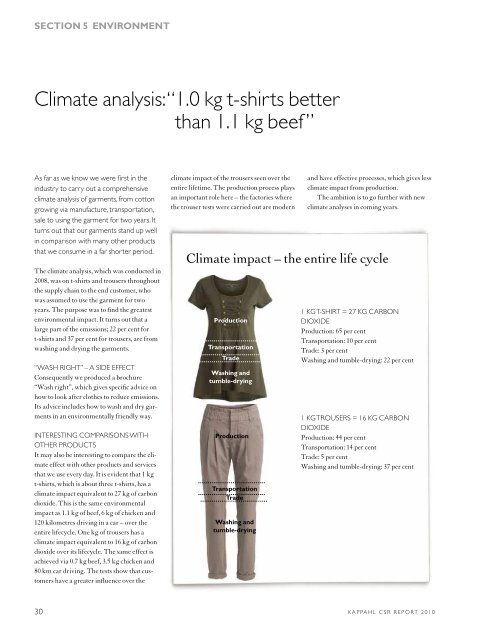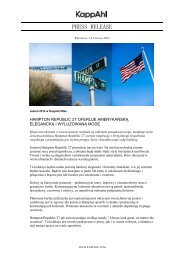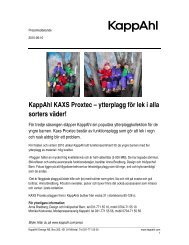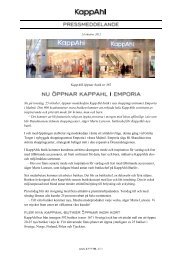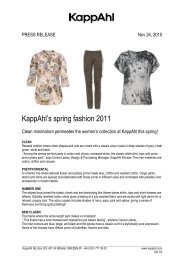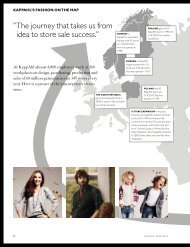Corporate Social Responsibility Report - KappAhl
Corporate Social Responsibility Report - KappAhl
Corporate Social Responsibility Report - KappAhl
Create successful ePaper yourself
Turn your PDF publications into a flip-book with our unique Google optimized e-Paper software.
SECTION 5 ENVIRONMENT<br />
Climate analysis: “1.0 kg t-shirts better<br />
than 1.1 kg beef”<br />
As far as we know we were first in the<br />
industry to carry out a comprehensive<br />
climate analysis of garments, from cotton<br />
growing via manufacture, transportation,<br />
sale to using the garment for two years. It<br />
turns out that our garments stand up well<br />
in comparison with many other products<br />
that we consume in a far shorter period.<br />
The climate analysis, which was conducted in<br />
2008, was on t-shirts and trousers throughout<br />
the supply chain to the end customer, who<br />
was assumed to use the garment for two<br />
years. The purpose was to find the greatest<br />
environmental impact. It turns out that a<br />
large part of the emissions; 22 per cent for<br />
t-shirts and 37 per cent for trousers, are from<br />
washing and drying the garments.<br />
“WASH RIGHT” – A SIDE EFFECT<br />
Consequently we produced a brochure<br />
“Wash right”, which gives specific advice on<br />
how to look after clothes to reduce emissions.<br />
Its advice includes how to wash and dry garments<br />
in an environmentally friendly way.<br />
INTERESTING COMPARISONS WITH<br />
OTHER PRODUCTS<br />
It may also be interesting to compare the climate<br />
effect with other products and services<br />
that we use every day. It is evident that 1 kg<br />
t-shirts, which is about three t-shirts, has a<br />
climate impact equivalent to 27 kg of carbon<br />
dioxide. This is the same environmental<br />
impact as 1.1 kg of beef, 6 kg of chicken and<br />
120 kilometres driving in a car – over the<br />
entire lifecycle. One kg of trousers has a<br />
climate impact equivalent to 16 kg of carbon<br />
dioxide over its lifecycle. The same effect is<br />
achieved via 0.7 kg beef, 3.5 kg chicken and<br />
80 km car driving. The tests show that customers<br />
have a greater influence over the<br />
climate impact of the trousers seen over the<br />
entire lifetime. The production process plays<br />
an important role here – the factories where<br />
the trouser tests were carried out are modern<br />
Production<br />
Transportation<br />
Trade<br />
Production<br />
Transportation<br />
Trade<br />
and have effective processes, which gives less<br />
climate impact from production.<br />
The ambition is to go further with new<br />
climate analyses in coming years.<br />
Climate impact – the entire life cycle<br />
Washing and<br />
tumble-drying<br />
Washing and<br />
tumble-drying<br />
1 KG T-SHIRT = 27 KG CARBON<br />
DIOXIDE<br />
Production: 65 per cent<br />
Transportation: 10 per cent<br />
Trade: 3 per cent<br />
Washing and tumble-drying: 22 per cent<br />
1 KG TROUSERS = 16 KG CARBON<br />
DIOXIDE<br />
Production: 44 per cent<br />
Transportation: 14 per cent<br />
Trade: 5 per cent<br />
Washing and tumble-drying: 37 per cent<br />
30 K A P PA H L C S R R e P O RT 2 0 1 0


